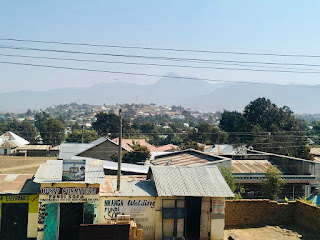It doesn't seem possible that a national border could have such an acute influence on the culture. But so it seemed to me, for when we crossed from Zambia into Tanzania, everything changed abruptly. Perhaps I had just grown used to Zambia. The rush of nostalgia that hit me there is hard to discribe - I had only been in East Africa once, Uganda, and that for four months in 2013. But there was something familiar about Tanzania now that felt different than anything else on the trip before. I think for both of us the crossing into Tanzania seem significant. Some of August's Swahili came back to him (mambo, njuri, keshwahiri, asante), from when he travelled here with his bicycle in 2012. His fondness for the landscape and people is evident in his eyes. Driving from the border post into the rural landscape, he told me for the first time of the police officer in Tanzania who bought him a cold drink. "Yes, he asked about my trip, told me to follow him (which I did nervously) and then he bought me a coke. The Tanzanians are super friendly." That incident, I thought afterwards, perhaps so singular among other stories about officials in Africa, will remind me of the exceptions that always break the rule.
The landscape has also changed. We noticed a slight change in gradient and the hint of rolling hills in the north of Zambia, but it was nothing like after the border, when suddenly we were surrounded by mountains, high forested hills, houses and plantations, in my mind heaving up-and-down like on an undulating ocean. Suddenly there were layers in the landscape (to my painter's eye), not just the immediate 10m radius in so much of the South. Is this the start of the great rift valley? I asked, awed. Even the plants, as if inspired by the lively red soil beneath it, burst with more energy.
While waiting in the car queue for fuel after the border, the smell of rice mix with that of exhaust fumes, grinded metal, tar and of humanity everywhere. Rice! Spiced rich. And just as I realised it's lunch time, the call of the Imam begin sounding for prayers. And I see long white tunics (for moslem men) at a street vendor, and women wearing full body covering (burka or chador). There are bright red tuk-tuks burring past us, and trucks and busses, and the streets are more frantic than any we've seen on the trip so far. It must be what India must feel like. A woman with a plastic basin full of grapes walked past, the first grapes I had seen in months, and then another with oranges. There are kids with buckets of sugar cane on their heads, and parked motorcycles glistening in the sunshine. A man with 10 trays of 24 eggs each on his head hurry past the car. Schoolgirls wear ankle long dark blue skirts. The sensory overload, like in my Kampala days, is overwhelming.
I try to hide in the car from it all, but later join August at a mpesa booth (mobile money transfer point), tucked between 5 other small vendors and pavement stalls. We have to pay there for the comesa insurance a few offices down the road. Behind the sooty glass is a girl, about my height, wearing hijab, busy handling a card machine in one hand and dealing out cash with the other. There seems to be four transactions happening at once, dark hands reaching into the glass from behind us, some changing dollars for shillings, others making card payments and some counting greasy bank notes. I am reminded briefly of childhood church basaar paper money - the shillings feel so numerous (R100 equals TSH15,000). The girl catches my eye and steals me a small, but earnest smile. I feel drawn into her life, exchanging places for a brief moment and wondering at her. Swamped by the grasping hands of the shopkeepers and agents, hustlers and endless transactions, while young as she it, she seems to keep it all together, calmly. How strange life is - I tell myself. Her normal life, her reality, so extravagant in my eyes.
We have a few bucket list items for Tanzania, the obvious being serengeti and zanzibar, but the hours and hours spent in 'getting there' (the daily grind as August calls it) is just as much part of the trip. The slowness of the journey is something we both value. It is full moon now (our tent has mesh in the roof) and last night I asked whether we really were just at Vic falls the previous full moon - it feels like a lifetime ago. We don't want this kind of slow but rich experience to end. If we find out how, we'll let you know. For now we'll just savour the beans-and-rice and the brightness of fanta and plastic chairs and tables.




No comments:
Post a Comment